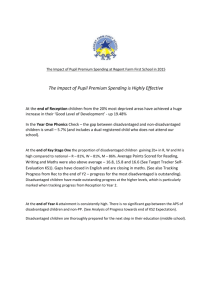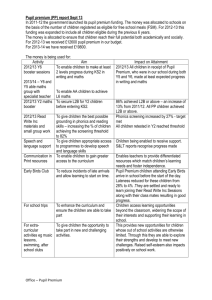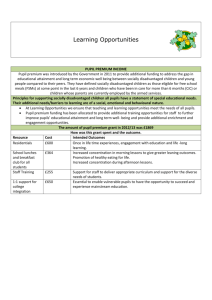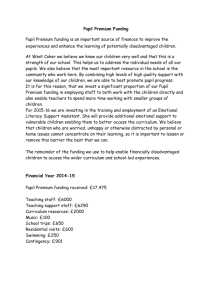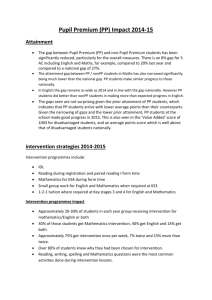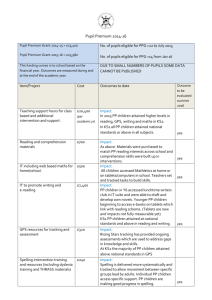Pupil Premium statement 2014-15
advertisement
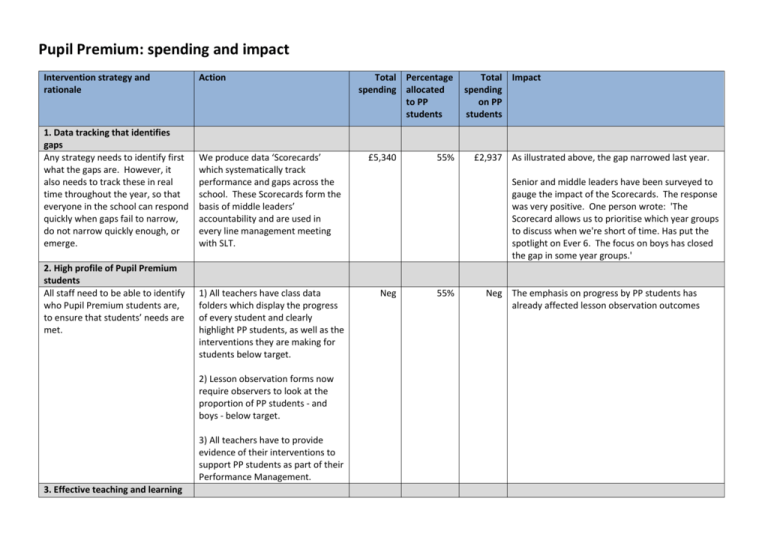
Pupil Premium: spending and impact Intervention strategy and rationale 1. Data tracking that identifies gaps Any strategy needs to identify first what the gaps are. However, it also needs to track these in real time throughout the year, so that everyone in the school can respond quickly when gaps fail to narrow, do not narrow quickly enough, or emerge. 2. High profile of Pupil Premium students All staff need to be able to identify who Pupil Premium students are, to ensure that students’ needs are met. Action We produce data ‘Scorecards’ which systematically track performance and gaps across the school. These Scorecards form the basis of middle leaders’ accountability and are used in every line management meeting with SLT. 1) All teachers have class data folders which display the progress of every student and clearly highlight PP students, as well as the interventions they are making for students below target. 2) Lesson observation forms now require observers to look at the proportion of PP students - and boys - below target. 3) All teachers have to provide evidence of their interventions to support PP students as part of their Performance Management. 3. Effective teaching and learning Total Percentage spending allocated to PP students £5,340 55% Total Impact spending on PP students £2,937 As illustrated above, the gap narrowed last year. Senior and middle leaders have been surveyed to gauge the impact of the Scorecards. The response was very positive. One person wrote: 'The Scorecard allows us to prioritise which year groups to discuss when we're short of time. Has put the spotlight on Ever 6. The focus on boys has closed the gap in some year groups.' Neg 55% Neg The emphasis on progress by PP students has already affected lesson observation outcomes Research shows that disadvantaged students make disproportionately good progress when teaching is most effective Smaller classes in English and Maths in middle ability sets. EEF research has shown that this can have a positive impact on student progress of around 3 months. Improving feedback. EEF research shows that effective feedback can improve student progress by around 9 months. School policy is for teachers to use WWW and EBI to structure their written feedback. 4. Improving literacy and numeracy Pupil Premium students tend to have lower KS2 scores, lower CAT scores and lower reading ages in Y7. One to one tuition in English and Maths (provided externally) Literacy intervention (including Units of Sound) Numeracy intervention The Movement Programme is delivered daily by English teachers to all Y7 students. It involves 20 minutes of coordinated activity followed by an intense literacy £38,000 55% £0 55% £7,600 55% £52,208 76% £6,180 87% 55% £20,900 See headline data on the narrowing of our PP gap. £0 All teachers now use WWW and EBI to structure their written feedback, and we have trained staff on how to develop precise, developmental EBI comments, which require students to respond. £4,180 Last year, we had one to one tuition in Maths. Students who had the tuition were around 50% more likely to make their target grade than comparable students who did not. This year, one to one support will be offered in English and Maths. £39,678 Last year students with intervention made an average of 19 months progress over 6 months intervention. This year, there are 41 students accessing intervention, 31 of whom are eligible for Pupil Premium £5,377 Last year students with intervention made an average of 10 months progress over 6 months intervention. This year, there are 30 students accessing intervention, 26 of whom are eligible for Pupil Premium £0 In 2013-14, 40% of year 7 made more than expected progress (more than 2 sub levels). This year, we are expecting greater gains as the programme is being delivered entirely by English teachers. strategy focused on specific students' needs. DEAR (Drop Everything and Read) days in which students spend the first ten minutes of each lesson reading a book of their choice 5. Attendance PP students tend to have lower attendance than non-PP students. Neg 55% We have an attendance officer, and an Assistant Headteacher with specific responsibility for attendance. Assistant Heads of House also have specific responsibility to make interventions for students with lower attendance. Subsidy of school bus service to transport students from most deprived neighbourhoods £59,180 75% £20,000 55% Punctuality. Students who are late to school now have same day detentions. Factored in elsewhere Neg This has helped to raise the profile of reading around the school significantly. We are planning to introduce daily DEAR time to embed a culture of reading across the school. £44,385 Attendance of PP students is now above the national average for PP students. Attendance has been a major focus at Henbury, and as a result it reached 93.9% in 2013-14. Last year also saw a slight narrowing of the gap (by 0.1ppts) between the attendance of PP students and non-PP students (the gap narrowed more sharply – by 1ppt – for students currently eligible for FSM). £11,000 This means some of our most disadvantaged students are able to get to get to school at minimal cost and on time. It is also important to ensure good attendance from these students. 6. Learning habits School data shows that students who are late, lack equipment or fail to complete homework are more likely to be PP students. Since last year, the gap has narrowed between disadvantaged students and other students, in terms of the average number of lates each week. It has fallen from a gap of 73 each week to 33 each week Students are expected to have a pencil case with a full range of equipment, including a green pen to assess their own learning and respond to teachers’ comments. Students lacking any piece of equipment are given a same day detention. To make sure that all students are able to afford equipment, it is all available to buy from the school reception for £1, and in exceptional cases we waive this cost. Costs here also include subsidy for school uniforms EEF evidence suggests that effective homework can improve student progress by around 5 months. Effects are strongest at secondary level. We have introduced, and trained staff how to use, a new web-based tool called Show My Homework, which allows students, teachers, parents and school to view and monitor homework. We are also expanding the capacity of computers in the library to ensure that students have supervised support for homework every day after school Our school breakfast club provides a free breakfast for any student who wants it. 7. Opportunities and aspirations £1,000 75% £750 Since last year, the gap has narrowed slightly between disadvantaged students and other students, in terms of the average number of lack of equipment incidents each week. It has fallen from a gap of 16 each week to 13 each week £8,728 55% £4,800 In itself, more structured and monitored homework should disproportionately benefit PP students, who sometimes do not have a structured home learning environment. In our student survey, the percentage of students who agreed with the statement 'My teachers set regular homework' rose from 72% in 2013-14 to 90% in 2014-15. In 2014-15, 82% of PP students agreed with this statement compared with 93% of nonPP students. We aim to narrow this gap. £7,500 75% £5,625 Students who take advantage of this tend to be PP students. It has reduced the amount of fizzy drinks / sweets that staff have to confiscate at the start of the day. PP students sometimes are not encouraged to think so broadly about possible future careers. They might have access to fewer networks of support or contacts at home, and fewer opportunities for enrichment Lesson 6: staffing costs and enrichment activities £81,000 55% Motivational speakers £3,000 55% Extra-curricular trips/visits/residentials: subsidy for PP students £2,000 100% £10,000 55% £5,587 91% Music tuition: subsidy Duke of Edinburgh £44,550 We provide a wide range of enrichment activities, to which many students, and particularly poorer students, would not otherwise have access. For example, we offer swimming, gardening and music. Feedback from students about what is offered is very positive and many students opt to take more than one Period 6. £1,650 All students benefit from this, but PP students are likely to benefit particularly in terms of raising aspirations. £2,000 We provide in some cases generous financial support to poorer students to participate in a wide variety of trips, as far afield as New York, Uganda, Iceland, Poland and Barcelona. £5,500 Case study. One student received weekly peripatetic saxophone lessons between Y9 and Y11. The Music department also gave her weekly extra support after school. She has since gone on to Cathedral School and has an unconditional offer to study Music at Middlesex University. £5,084 In 2014-15, 5 students are undertaking a Silver award and 39 a Bronze. The vast majority of these students are PP. Individual activities and tuition for Children in Care £4,868 100% £4,868 Children in Care have a dedicated mentor in school who they meet at least once a week. The student and mentor will look weekly at their attendance, achievement, rewards, behaviour and the targets set at the last meeting such as homework and organisation. They also discuss a wide variety of other bespoke support that the student might need, including financial support for trips and equipment. We are about to set up personal tutoring for our CiC in English and Maths from highly trained staff. Counselling £25,000 75% Family support worker £28,000 75% £18,750 We complete an audit of this twice a year. Last year (2013-14) a total of 120 students were seen for counselling to discuss a full range of issues including bereavement and relationship issues. Many of these are disadvantaged students. Students are surveyed to gauge the impact of the counselling. 100% of students agreed (and 74% strongly agreed) that the counsellor 'helped me see things in a more positive way'. £21,000 Our family support worker ensures that all outside agencies are brought together to support families. She also ensures students have their free bus passes. She has worked with 32 different families in the last year. 8. Improving students' behaviour ‘AIMED‘ project for KS4 students at risk of permanent exclusion £88,000 83% £73,040 In 2013-14, 4 students went on to college, 1 to work. Two students gained GCSE Maths at Grade F and three students gained a GCSE English at Grade G. Three students gained a St John's Ambulance Lifesaver Award Case study. One student on the AIMED project was severely disengaged and very poorly behaved at the end of KS3, and as a result was at serious risk of permanent exclusion. At that time, their attendance in lessons was just 38%. After nearly two years on the AIMED project, their attendance in lessons has risen to 84%. As well as working towards their DofE Silver Award, the student is on target to achieve a BTEC in Catering, a BTEC in Construction and their Maths and English GCSEs. He is planning to do an apprenticeship in the building trade or carpentry post 16. Next year, AIMED is being redesigned as part of GCSE options, with the aim of ensuring more students achieve academic qualifications. ‘Thrive’ project to support vulnerable students at KS3 £50,812 88% £44,834 This provision started in February 2014. The Thrive programme works through 6 ageprogressive developmental stages. Once assessed, it provides strategies and activities to help the student re-engage with their learning and think about how to manage their feelings. Two students achieved 2 levels of progress. Four students achieved 1 level. One student made 4% progress within their starting level & one made 14%. Two students have left the programme as they had made no progress. Case study. One student started on Thrive in October 2014 and was assessed as in the “Being” stage of emotional development (0-6months), which covers ‘Feeling Special’, ‘Feeling Safe’ and ‘Having Needs Met’. He scored the lowest in having needs met, so targets were chosen from this area and worked on through activities, in class support and report. On reassessment in January 2015, the student had progressed beyond “Being”, through “Doing” (6-18months) and in to the “Thinking” stage (18mths – 3 years). Activities and targets have been adjusted and adapted to continue to support his emotional development within Henbury School. This progress is exceptional within the time frame. ‘Forest Schools’ for disengaged students at KS3 £2,756 100% £2,756 Case study. One student was referred to Forest School provision in January 2015 following an escalation in poor behaviour. Prior to attending Forest School he was averaging 180 behaviour points a month. After only one month this has reduced to around 160. Forest School activities allow students who are struggling in school to learn in a different way, boosting engagement & concentration which will then be carried over into the classroom. Activities on Forest School are allowing this student to realise he can work effectively, be part of a team. He is also beginning to develop better social skills. ‘Bright Sparks’ project to engage under-achieving students at KS3 £6,000 73% £4,400 For the 12 students on Bright Sparks last year, average attendance rose by 1.8% points from the year before. Two-fifths showed a noticeable improvement in behaviour. Holiday activities for disengaged students, with School Beat Officer £4,000 75% £3,000 Last summer, 42 students took part in at least one activity, which are available either 5 or 7 days a week during the school holidays. Students gain a huge amount from the activities, including the cultural and social benefits of long distance and residential trips, and in some cases gaining certificates (eg of sailing competency). Students come back into school more focused and ready to learn and the police report a marked reduction in youth crime during activities. We have an exclusion room to which students are sent for serious issues, for which in the past they would have received a fixed term exclusion outside of school. Students are completely isolated from other students and have a £29,250 75% £21,938 For many students, and particularly disadvantaged students, serving their exclusions isolated from others in school is more of a deterrent than serving them at home, where they might not be supervised. It also ensures that students are supervised closely in school with work, which keeps them in the habit of attending school and staggered day. 9. Year 11 support Some PP students do not have access to a quiet place to study at home, and might need extra support when preparing for exams. They might also need additional IAG when thinking about careers A dedicated Year 11 study room for Y11 students to work at social times and before and after school, which is particularly valuable to students who don't have access to a good study environment at home. Free revision materials Revision days during the Easter holiday and half term Revision breakfasts before all exams Subsidised prom tickets for students with high attendance, who have attended additional study sessions IAG consultant who works with most vulnerable students. PP students are identified in lists and are interviewed early in the IAG process. Parents and carers are also able to meet with the advisors, who attend parents’ evenings in years 9, 10 and 11 and who also offer a dedicated IAG information evening for students in years 10 and 11. Visits to post 16 centres to increase take up and improve making academic progress. £13,500 55% £7,425 Our Y11 support is particularly beneficial to PP students, who might not have access to the right support, encouragement, or resources at home in order to study and revise. £390 £2,500 55% 55% £215 £1,375 £700 55% £385 £1,500 55% £825 £6,000 75% £4,500 £1,200 55% £660 transition 10. Mentoring Pupil Premium students tend to need more support, challenge and encouragement to succeed. Careers day for Year 11 students £3,500 55% £1,925 All tutors provided academic mentoring for 3 students in their tutor groups who were underachieving. £8,000 65% £5,200 We undertook a rigorous evaluation of this programme which revealed that students in the academic mentoring cohort made almost no better progress than those who weren't in it (the difference was statistically insignificant). Given the amount of staff time and commitment this required, we have therefore discontinued this programme. As a school, we are in the process of reviewing the mentoring programmes that we offer. An Assistant Headteacher has responsibility for narrowing the gap, including Pupil Premium. This is a proportion of his time. £34,367 75% Administrative support for the above, including administering uniform, equipment, sending letters to parents and monitoring programmes such as academic mentoring. £19,974 75% £25,775 The Assistant Headteacher has had the chance to pull together what the school is doing to create a coherent strategy overall to support PP students. He has also been able to identify areas where PP students could be supported better. £14,981 11. Leadership and management TOTAL This is in excess of the approximately £330,000 we £456,267 have allocated to us through the Pupil Premium


